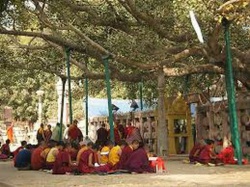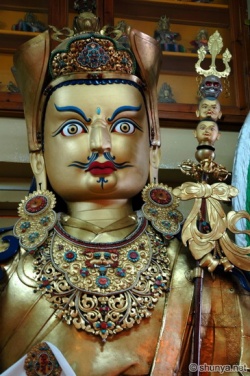The essential path of all traditions
DEVELOPING RENUNCIATION
THE ESSENTIAL PATH OF ALL THESE LIMITLESS DHARMA VEHICLES, some of which have just been briefly described, is to DEVELOP RENUNCIATION of the sufferings of Samsara 24. The basis for such renunciation is to follow the code of the conduct set forth in any one of the seven acts of Self-Liberation (Skt: Pratimoksa) Vows.
- The Precious human Rebirth and Impermanence
Meditate on the difficulties of receiving a precious human rebirth and on whether this excellent condition of free time will continue. Think about how difficult it will be to obtain another human form, endowed with such leisure, in the future. Right now, we have it and our rebirth has such great meaning that it is as precious as a Wish- granting Gem. But this life will not last. Death approaches quickly. It is uncertain whether we will die when we are old, young or middle-aged. The circumstances and conditions for death are many, but the conditions maintaining life are few. Days, months and the four seasons, friends, relatives and enemies etc. all change and pass away. By thinking again and again of all these changes, please remember impermanence.
- Karma
You should not think that after death you will just dissolve into the middle of space. Nor should you think that humans are necessarily reborn as humans, or horses as horses. All sentient beings are thrown by their actions (Skt: KARMA) into the many different places and forms in which one can take rebirth in cyclic existence: in high or low realms; with great or small enjoyments; property or power; with a good or bad body. In this Samsara there are a lot of different karmas and results. All these various appearances amd aspects of existence arise due to different deeds of virtue, non-virtue or some combination of the two. These deeds can be considered into the ten virtues or non-virtuous 25 actions.
The result of virtuous and non-virtuous actopms ripens in four different ways:
(i) as the matured result
(ii) as experience in accordance with the cause
(iii) as activity in accordance with the cause and
(iv) as the (personal and collective) environmental result 26.
Virtuous and non-virtuous actions ripen only in their own specific results 27. If you have not done the action (karma) you cannot meet with its result, but the results of all the actions that you have done throughout time, will not vanish of their own accord. It is certain that the result will come 28, and that it will come to the one who created the karma. All the phenomena seen in your experience are the result of karma. You can experience the result of your karmic actions during the same life, the next life or any life after that.
There are karmic results which are certain to ripen and ones which are uncertain. Please refer to the Sutras and their Commentaries for more detailed explanations of all the various aspects of action (karma) and their results. The practice of adopting and abandoning (the appropriate) causes and their results is the heart of the Buddha's Dharma, and the Four Noble Truths and the Law of Interdependent Origination 29 are the Dharma's profound and essential points.
- Cyclic Existence and Suffering
Thrown by the force of karma the six classes of sentient beings wander, lost through the three lower and the three upper realms 30. In the Three Spheres of Existence 31, there is nothing, not even one atom, which is not conditioned, and, as a result, the suffering of suffering, the suffering of change and the pervasive suffering of conditioned existence 32 torment the beings reborn there. In particular, each realm is afflicted with its own specific sufferings 33.
Non-virtuous actions result in sufferings, while defiled virtuous actions 34, cause rebirth in the upper realms, and especially unwavering Worldly Concentration 35 which throws one into the highest realms, the Formless Realms. But even these beings, who are in such high states, must take rebirth again because they have not abandoned ignorance (the root of Samsara). They will fall into lower states in their next rebirth. That is why remaining like this in cyclic existence is like staying in a fire, or a nest of poisonous snakes. Do not wish or pray for samsaric happiness. Instead, please develop a sound renunciation of the causes of suffering, always wishing to be free from the circle of rebirths.
THE SPIRITUAL MASTER
The root of entering the path to Nirvana is the SPIRITUAL MASTER. Stay near and rely upon him. Choose a Master who has tamed himself through having heard many teachings. He must be skilled in the practice of the Law of the Way (Tib: Tsul.trim or Discipline of Morality) and Bodhicitta 36, having a Pure View of Reality and Great Compassion. He should have the ability to cut the doubts of others. Then, after having received Initiation and Tantric Samaya (sacred viws and committments) from this Lama, you should do whatever he says. As your faith and devotion grow, good qualities will be accomplished. Therefore, stay close to an excellent Lama, cherishing the opportunity to serve him. The Lama's speech and advice are the same as the nectar of immortality. As much as you have heard, none of it should have been in vain. So, without abandoning any of it, adopt it into your own practice. Think and meditate upon his advice, because no benefit will come from merely hearing, just as water cannot quench your thirst unless you drink. For this reason, you should stay in an isolated and secluded place.
REFUGE
Taking REFUGE is the foundation of the Path and of all the vows. It distinguishes Buddhists from non-Buddhists, providing one with the protection of all gods and humans. It causes one to achieve the accumulation of all good and auspicious things in this and later lives. We should entrust our minds to the Three Jewels of Refuge: Buddha, the teacher, Dharma, the protector and Sangha, the liberator. When taking Refuge, do not deceive yourself by merely mouthing the words, but develop a real confidence in the Objects of Refuge. Then, carefully guard all the commitments of the Refuge.
BODHICITTA
The main practice of the Mahayana is BODHICITTA, which is the essence of the churned milk of the Holy Dharma. If there is no Bodhicitta, your practice, whether Sutra or Tantra, will be as 'essenceless' as a banana tree. Not only that, you should also remember that, wherever space pervades, there are sentient beings (who are searching for happiness). One's own rebirths, taken sequentially, are beginningless, and so we have had parents countless times. Each sentient being has been our mother and father innumerable times, and so, the amount of benefit we have received from them is inconceivable. Therefore, we should meditate on Love and Great Compassion for all sentient beings: enemies, friends, relatives and strangers. Develop equilibrium which is free from holding some close with desire and others distant with anger. By thinking with a good heart of the benefits of others, you must use your body, speech and mind to practice virtue, always making special and noble prayers.
DEVELOPING THE PURE VIEW
- Methods
The methods for developing the PURE VISION withtin oneself are to completely accumulate all the merits and to purify obscurations. It is extremely useful to exert yourself in these. Practice the Seven Branches 37, do prostrations, circumambulations, read Sutrasm recite Mantras and practice the Bodhisattvas' Confession of Downfalls 38, which is complete with the four Opponent Powers 39. Do this with diligence and all your negativities, obscurations, broken vows and downfalls will be purified. The essence of the accumulation of merit is the mandala offering, so you should do this also. By joining all these accumulations of conceptualised merit with the Wisdom which realises the lack of self-nature of the three (subject, object and action), we accumulate the Collection of Wisdom. From the Collection of Merit comes the accomplishment of the Form Kayas of the Buddha, and from the Collection of Wisdom, the Dharmakaya is attained. Therefore, if you work with diligence in both purification and accumulation, the Pure View will grow withtin you.
- Concentration
Firstly, search for CALM ABIDING (Tib: Shi.nay, Skt: Samatha) using the method of progressing through the Nine Stages of Abiding Mind 40. Abandon the five downfalls 41 by relying on the eight compounded mental faculties 42. Concentrate one-pointedly, either with, or without an object. Bliss, clarity and non-conceptualisation will grow in deep meditation. All these, however, will just press the head of your defilements, (temporarily suppressing them).
- Wisdom
Then, establish the VIEW OF EXTRAORDINARY INSIGHT, (Wisdom). The root of beginningless Samsara is self-grasping and in order to destroy this ignorance from the root, you must meditate on establishing Emptiness (Tib: Tong.pa.nyid, Skt: Shunyata) with certainty. From the support of the compounded collection of the five aggregates 43, the imagined 'I' is spontaneously born. In order to destroy, from the root, all the different aspects of grasping to this self, it is essential to analyse each of the various examinations, such as whether the aggregates and the self are the same or different etc., which are set forth in the logic of Madhyamika 44. First establish the realisation of the selflessness of the person and then the selflessness of phenomena. Do a detailed analysis of the many different parts of the self of phenomena, included in which are both the (objects) grasped and the (mental aggregates) grasping.
Obtain a certainty in your understanding of the meaning of selflessness. Then, finalise the realisation that all phenomena which are included in Samsara and Nirvana are by nature unborn, and all arise in equality. Understand the deep logic of Interdependent Origination by knowing that all phenomena of appearance and sound unobstructedly self-arise from the state of unborn Emptiness. By having an understanding of the unity of Emptiness and Interdependent Origination, and not mixing this understanding with grasping, you should stay in the non-conceptual meditation of the Middle Way. Meditate like this as much as you can.
- Conclusion
In conclusion, the two methods of Analysing and Focussing Meditation should be mixed. By having discriminating Wisdom, we should unite together, one-pointedly, unmoving Calm Abiding and Insight Wisdom Meditation. We call this the Pure View. It is the actual meaning of the meditation of the Perfection of Wisdom (Skt: Prajnaparamita), the mother of the Buddhas. By doing this Focussing Meditation, where the mind is placed without mental wandering on the view, free from all the illusions of the eight extremes 45 and free from all mental fabrications, we are engaging in the action of the excellent and holy path of the Bodhisattvas.
From this, we shall achieve the result of the completion of the Five Paths 46 and the Ten Bodhisattva Stages (Skt: Bhumis) 47. We shall attain the realisation of Enlightenment, abiding in neither Samsara nor Nirvana, spontaneously accomplishing the two purposes of self and others. ALAS! Nowadays, in the depths of the five degenerations, many of the great Dharma Holders have passed away to another sphere and this earth isfilled with a lot of gossipers, like myself. All the anti-gods are laughing with joy (when we are naughty) and the gods and goddesses favouring the white side (virtue) have scattered and escaped far away. The teachings of the Buddha are like the drawings of a butter lamp. This is how it has become.
All Great Compassionate Ones, please pay attention to us!
Those who hold a great love for the Buddha's Dharma should work diligently with the scriptures, realisations, explanations, practices, renunciations and readings, never going beyond the ten virtuous actions. Make prayers and offerings, acumulating the Collections as quickly as possible.
THE NON-SECTARIAN APPROACH
The Sangha should be friendly with each other. DO NOT HOLD ANY SECTARIAN ATTITUDE towards the different lineages. Do not create differences and contradictions amongst the different teachings. Abandon criticism of the Dharma. In short, avoid taking sides and being sectarian. By understanding that the many different ways of explaining the ocean-like Dharma are all for the purpose of taming one's own mind, please practise. Always keep your body, speech and mind in a tame, calm, relaxed and peaceful state.
With mindfulness and understanding, please be careful. King Krikri had a dream 49 which signified that Buddhism in India would become a doctrine disputed by the eighteen schools of the Hinayana. And so it happened that gradually Buddhism declined in India. Even in the northern direction of Tibet, the seeds of sectarian disagreement were sown in the Traditions of the Sakya, Gelug, Kagyud and Nyingma. Such sectarian disputes cause people to become agitated, disturbed and confused. They harm both this and future lives, creating negatives for oneself and others.
There is not even the slightest meaning or essence in holding these sectarian views, so we must abandon all such attitudes in order to protect and preserve the Buddha's Dharma. Since the Buddha has attained a state of fearlessness, no one has the power or ability to destroy his Dharma from the outside. But, just as small insects consume the stomach of a snowlion from the inside, destroying his health, in the same way, it was predicted in the Sutras that the Buddha's Dharma would be destroyed from withtin.
Remember this advice and keeping it in your mind, abandon whatever is contrary to it and adopt whatever is in accord with it. Householders should make offerings to the Buddha, Dharma and Sangha, and, with the intention of benefitting others, enthusiastically persevere in doing virtuous actions. In this way, the present life and all future lives will be happy, virtuous and auspicious. I (Chokyi Lodro) am close to death now. I am old. All I can do is to have a good heart, with devotion for the Buddha's Dharma. I really do not have any power to benefit the Dharma or sentient beings.
All I can do is to pray earnestly for the flourishing of the Dharma. The highest source of benefit and happiness in the Land of Snows is Tenzin Gyatso (Holder of the Ocean of Dharma), the fourteenth Dalai Lama. May his lotus feet remain on this earth for a very long time. May Amitabha protector Panchen Lama, the Gyalwa Karmapas and the Manjushri (Tib: Jamyang, sweet- voiced) Sakyapas (His Holiness Sakya Trizin) and all other Dharma Holders have long lives and may their Dharma activities constantly increase and become vast.
May the Prime Minister, President, Ministers and peoples of the Noble Land of India have wealth, happiness and enjoyment and may the Buddha's Dharma flourish there once again. May the sounds of the great drum of the Dharma's Sacred Writings spread from here to the top of the Universe. May all be auspicious. This "Opening the Dharma" was written at the request of the Governor of Sikkim (Upa Sahib), by a Tibetan holding the name of Jamyang Khyentse's emanation (from Dzongsar), stupid Chokyi Lodro, who, with an extremely good heart, wrote uninterruptedly. May this virtue bring benefit to the Holy Dharma and to all those wandering in Samsara.
Sarwa Mangalam.






